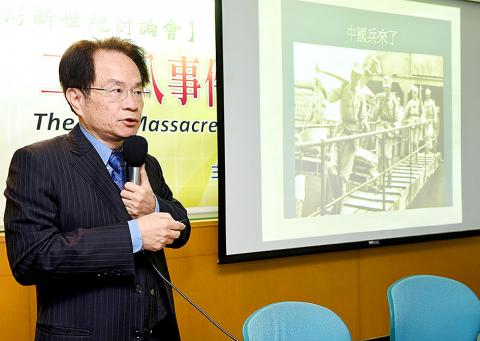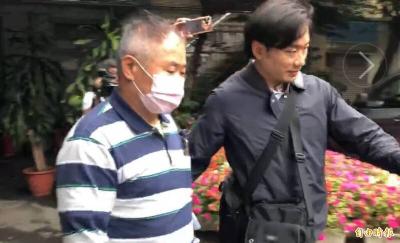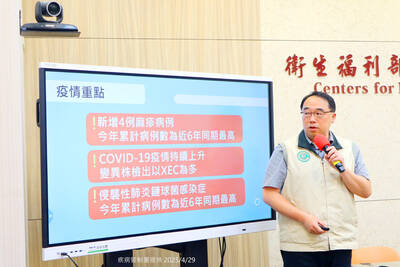Chiang Kai-shek’s (蔣介石) obstinance when dealing with the aftermath of the 228 Massacre played a larger role in sparking the Taiwanese independence movement than the Chinese Nationalist Party’s (KMT) corruption after World War II did, Academia Sinica associate research fellow Chen Yi-shen (陳儀深) said yesterday.
Chen made the remark at a forum hosted by the Taiwan New Century Foundation in Taipei marking the 71st anniversary of the 228 Incident, a bloody crackdown launched by the then-KMT regime against civilian demonstrators following an incident in Taipei on Feb. 27, 1947.
The KMT headquarters had during its Third National Congress passed a resolution to relieve Chen Yi (陳儀) of his duty as Taiwan governor-general in light of his handling of the Incident, Chen Yi-shen said.

Photo: Chu Pei-hsiung, Taipei Times
Presenting a facsimile of the minutes taken during the congress, he said that Chiang, determined to protect Chen Yi, overruled the resolution, citing an article in the KMT’s charter.
Chiang would later sign off on an order to execute Chen Yi in Taipei in June 1947, after it was found through Chen Yi’s correspondence that he had conspired with the Chinese Communist Party against Chiang, Chen Yi-shen said.
Chiang favored Peng Meng-chi (彭孟緝) — a major-general at the Kaohsiung Garrison who “killed a lot of people in Kaohsiung” — as Chen Yi’s successor, despite former minister of national defense Pai Chung-hsi (白崇禧) and former chief-of-staff Chen Cheng (陳誠) advising against Peng’s appointment.
Peng was the person who referred Chen Yi, helping him become Taiwan governor-general, but instead of being punished, he was promoted, Chen Yi-shen said.
These incidents offer insights into Chiang’s mentality following the massacre and should serve as a reference when determining Chiang’s responsibility for the Incident, he said.
Chiang’s attitude likely played a larger role in sparking the Taiwanese independence movement than people’s initial disillusionment with the KMT government after it took over Taiwan from Japan, he added.
Chen Yi-shen showed a facsimile of one of Chen Yi’s letters to Chiang, which showed that Chen Yi attributed the cause of the Incident to “Japan-backed gentry and hooligans exploiting the ethnocentric ideology of Taiwanese autonomy to instigate terrifying persecution,” before asking Chiang to send troops to crack down on the unrest.
He later in a letter thanked Chiang for swiftly dispatching troops before the situation became “unthinkable,” and suggested that Chiang “modify the thinking of Taiwanese, thereby sinicizing them” by improving Chinese and social-science education, Chen Yi-shen said, drawing a parallel with the abolished “minor revisions” of high-school social-science curriculum guidelines by the KMT which sparked massive student-led protests in 2015 due to its disproportionately large focus on China.
In contrast to Chen Yi’s account, then-Control Yuan member Chiu Nien-tai (丘念台) said in a letter to Chiang that the outbreak was triggered by “corrupt politics” and “suffering industries.”
In the letter, Chiu estimated the number of massacre victims to be “more than several thousand,” which contrasted claims that there were only about 1,000, Chen Yi-shen said, adding that based on records he had studied, the actual number is likely about 20,000.
Meanwhile, Chen Yi-shen urged swift passage of the political data act, as it would complement the Act on Promoting Transitional Justice (促進轉型正義條例) passed in December last year.
Otherwise, it might be difficult to collect documents stowed away in the KMT’s archives or spread throughout society, such as Chiang’s diaries that are kept in the US, he said.
Democratic Progressive Party Legislator Yu Mei-nu (尤美女), who attended the forum, said the roles of the victims and the perpetrators during the authoritarian era could be intertwined, as victims could have also “victimized” others by giving their names during interrogations.
Determining the victims and perpetrators in the quest for transitional justice must be done carefully, Yu said.
The bill for the political data act has been prioritized for review during the current legislative session, she added.

A fugitive in a suspected cosmetic surgery fraud case today returned to Taiwan from Canada, after being wanted for six years. Internet celebrity Su Chen-tuan (蘇陳端), known as Lady Nai Nai (貴婦奈奈), and her former boyfriend, plastic surgeon Paul Huang (黃博健), allegedly defrauded clients and friends of about NT$1 billion (US$30.66 million). Su was put on a wanted list in 2019 when she lived in Toronto, Canada, after failing to respond to subpoenas and arrest warrants from the Taipei District Prosecutors’ Office. Su arrived at Taiwan Taoyuan International Airport at 5am today on an EVA Air flight accompanied by a

A 79-year-old woman died today after being struck by a train at a level crossing in Taoyuan, police said. The woman, identified by her surname Wang (王), crossed the tracks even though the barriers were down in Jhongli District’s (中壢) Neili (內壢) area, the Taoyuan Branch of the Railway Police Bureau said. Surveillance footage showed that the railway barriers were lowered when Wang entered the crossing, but why she ventured onto the track remains under investigation, the police said. Police said they received a report of an incident at 6:41am involving local train No. 2133 that was heading from Keelung to Chiayi City. Investigators

The Keelung District Prosecutors’ Office today requested that a court detain three individuals, including Keelung Department of Civil Affairs Director Chang Yuan-hsiang (張淵翔), in connection with an investigation into forged signatures used in recall campaigns. Chang is suspected of accessing a household registration system to assist with recall campaigns targeting Democratic Progressive Party (DPP) city councilors Cheng Wen-ting (鄭文婷) and Jiho Chang (張之豪), prosecutors said. Prosecutors yesterday directed investigators to search six locations, including the Chinese Nationalist Party’s (KMT) Keelung office and the residences of several recall campaign leaders. The recall campaign leaders, including Chi Wen-chuan (紀文荃), Yu Cheng-i (游正義) and Hsu Shao-yeh

COVID-19 infections have climbed for three consecutive weeks and are likely to reach another peak between next month and June, the Centers for Disease Control (CDC) said yesterday. Weekly hospital visits for the disease increased by 19 percent from the previous week, CDC Epidemic Intelligence Center Director Guo Hung-wei (郭宏偉) said. From Tuesday last week to yesterday, 21 cases of severe COVID-19 and seven deaths were confirmed, and from Sept. 1 last year to yesterday, there were 600 cases and 129 deaths, he said. From Oct. 1 last year to yesterday, 95.9 percent of the severe cases and 96.7 percent of the deaths